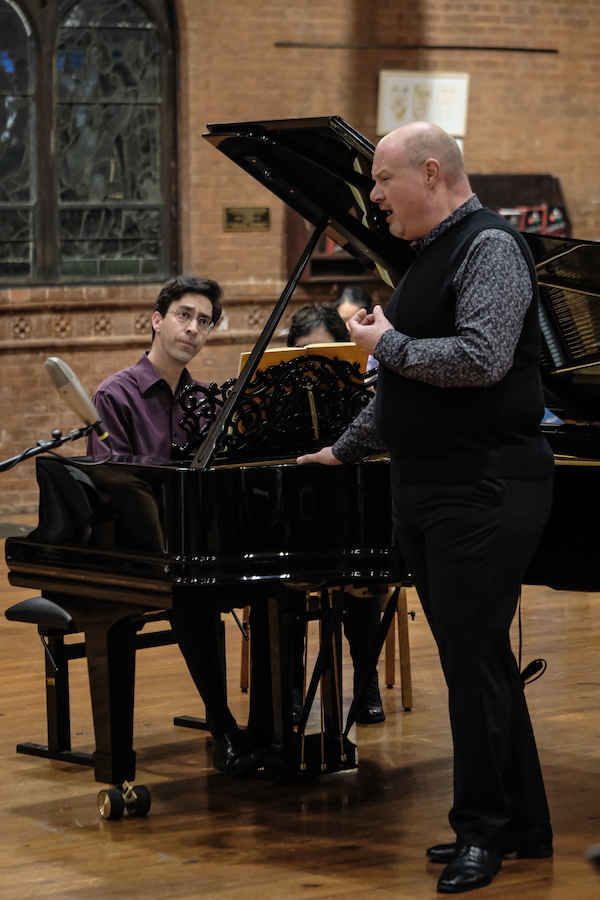Scarlata delivers a powerful, affecting “Winterreise” for Chiarina Chamber Players

Baritone Randall Scarlata and pianist Efi Hackmey performed Schubert’s Winterreise Sunday night at St. Mark’s, Capitol Hill. Photo: Benjamin Scott
The Chiarina Chamber Players presented Schubert’s Winterreise Sunday night, performed by baritone Randall Scarlata with Efi Hackmey at the piano. Composed in the last year of Schubert’s life, this 1827 song cycle sets Wilhelm Müller’s poems, which follow the dark musings of an unnamed narrator who, rejected in love, spurns society and wanders the wintry countryside.
Writing to a friend, Schubert referred to these as his “horrifying” songs. While some of the cycle’s most lyrical passages are the best known, maintaining interest over the cycle’s 75 minutes requires directly grappling with the thorny psychology of the narrator.
Sunday night’s reading at St. Mark’s, Capitol Hill, delved confidently into these depths, with Scarlata and Hackmey bringing a wide-ranging palette of colors and effects to realize the anger, irony, self-pity, and yearning in a single portrait.
The narrator’s angry resentment is a frequent theme in roughly the first half of the songs and Scarlata approached this material with ferocity, giving the audience wounded rejection in “Gute Nacht”—the opening farewell to the town—and an indictment of the inconstancy of his beloved and her family in “Die Wetterfane.” At times pushing his voice to strident fortes, Scarlata followed interpreters that have tested the line in prioritizing dramatic expression over maintaining a beautiful sound—a freedom particularly essential in a live performance. Scarlata was able to give voice to these extreme emotions while largely maintaining a sense of musicality, save for a few moments like the fevered endings of “Erstarrung” or “Rückblick” which seemed to lose connection with the lieder’s through line.
Yet there were opportunities for beauty as well in Winterreise’s signature moments of lyricism; Scarlata produced a warm flowing baritone in the lilting sweet passages of “Der Lindenbaum” and “Frühlingstraum.” While the baritone voice in these songs may lack some of the irresistibility of the original tenor settings, Scarlata delivered beguiling sotto voce effects and limpid high notes while never losing fidelity to the text.
Particularly intriguing was Scarlata’s handling of some of Schubert’s more ambivalent settings. In moments like the description of snow in “Wasserflut,” or the weeping willow in “Irrlicht,” Scarlata affected a thin, weakened sound and sliding pitch effects, hinting at an ironic detachment from, and perhaps creeping hostility to, elements of nature that represent both hope and dread to the narrator. In the comparison of the narrator’s heart to a frozen brook in “Auf dem Flusse” and the contemplation of the sleeping town in “Im Dorfe,” Scarlata plumbed darker vocal colors, the narrator becoming an almost malevolent figure who can only see the biting satire in these contrasts.
The darkness of the narrator’s outlook firmly established, Scarlata’s introduction of a note of gentle sympathy for his subject, first hinted at in “Rast,” as the narrator begins to feel the physical weight of his journey, made for a disarming and deeply affecting turn. In the late “Der Wegweiser,” with the narrator’s plea “I’ve done nothing wrong/That I should shy away from mankind” and his inability to retrace how he has ended at these crossroads, Scarlata’s vulnerability brought this thread to a poignant high point before plunging into the darkness of the final sequence.
Scarlata foreshadowed the narrator’s thoughts of suicide and death in “Der Lindenbaum,” as the branches call out to the narrator to find peace under the tree, adopting a pallid vocal color which increasingly pervaded the final songs, including a wan, exhausted “Die Nebensonnen.” The closing “Der Leiermann,” with the haunting figure of the old hurdy-gurdy player, was simply stated, an image of horror all the more chilling for feeling apart from the emotional journey that has come before, perhaps suggesting that the narrator’s struggle has, in some fashion, already come to a close.
Efi Hackmey, Chiarina co-founder and artistic director, was a compelling partner at the piano, setting a welcome sense of momentum and urgency from the outset in the pulsing chords of “Gute Nacht” and the opening of “Erstarrung,” with its echoes of Schubert’s contemporaneous Impromptus.
Hackmey seemed appropriately more interventional early in the cycle, bringing voices in the piano score to the fore in dialogue with the vocal line, but settling into the background to create a sense of stasis in the more contemplative final pieces. Hackmey also delivered characterful renditions of the musical illustrations that dot the piece, from the dogs’ chains in “Im Dorfe,” to the wheeling crow in “Die Krähe,” and fluttering leaves in “Letzte Hoffnung.”
Chiarina Chamber Players perform chamber-sized concerto works by Clyne, Suggs, and Chopin 7:30 p.m. February 5. chiarina.org


